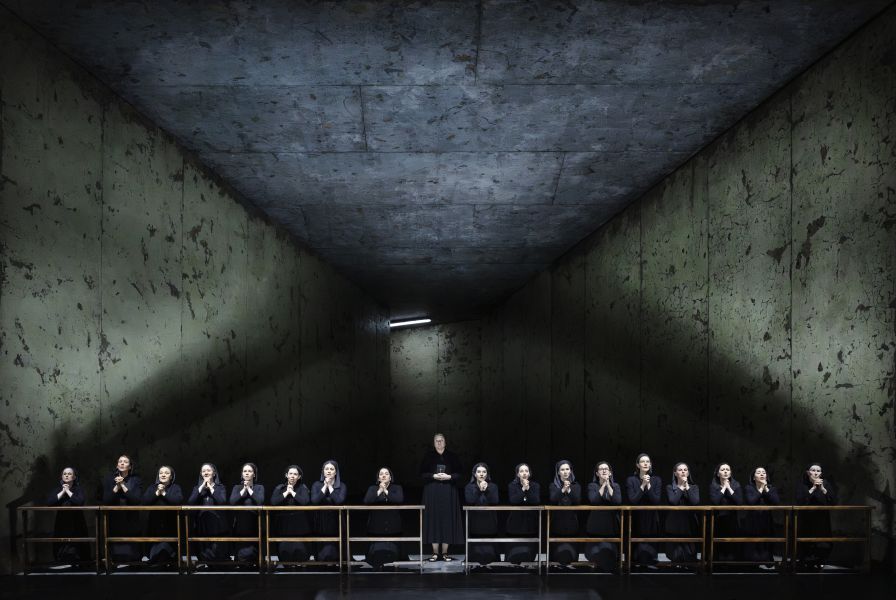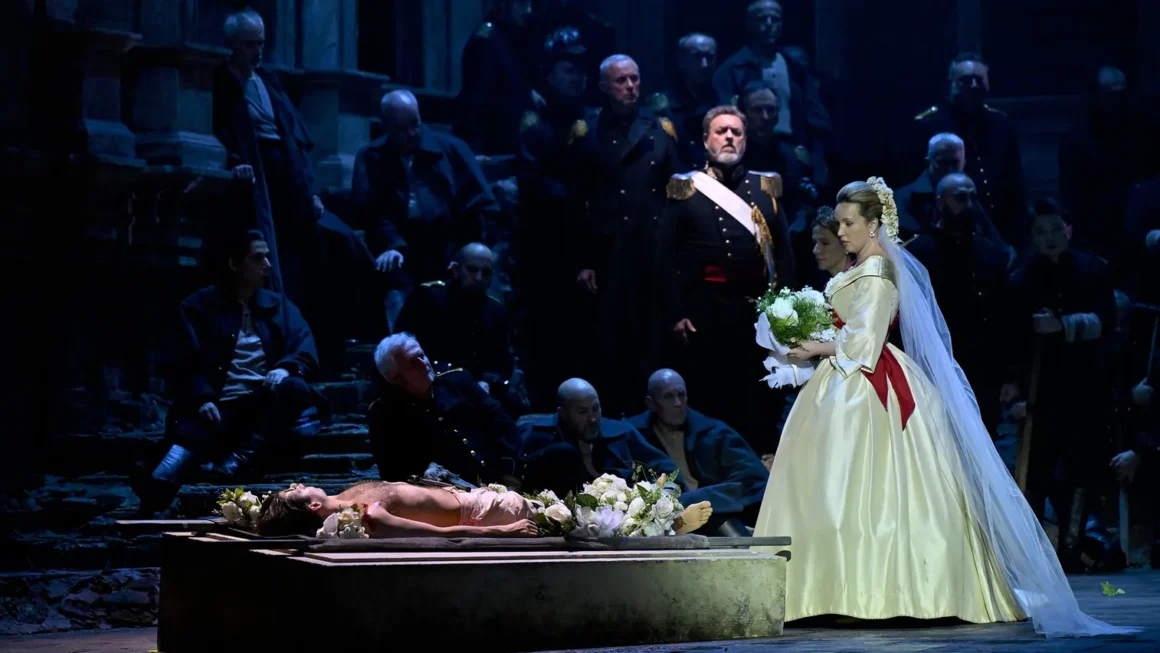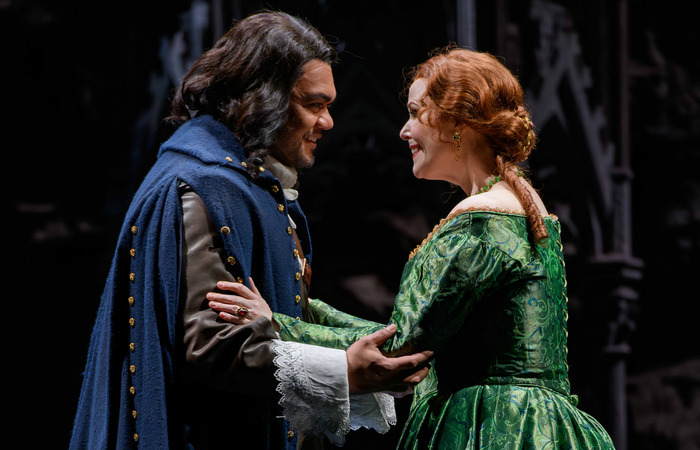Some operas play a pivotal role, both in the careers of those involved in their production and in the public’s experience of them. Pieces that, through the power of their narrative and the emotion they convey, are capable of captivating the audience from the very first bars and keeping them breathless until the curtain falls. These works serve as a musical bridge between a set of ideas and values conveyed by the composer and his audience. And when the audience is receptive to what the composer wishes to communicate, it is at that precise moment that the operatic experience takes shape, elevating stage, pit and audience to the summit of emotion.

Without doubt, such was the case with Guercœur, currently being performed at the Oper Frankfurt. When the story of Albéric Magnard and this work (unfortunately far too rare) is known, it becomes clear that Guercœur is not an opera like the others – starting with its name, Guer-cœur, and the confrontation between two concepts that are diametrically opposed but coexist with such finesse in this juxtaposition. A work that stands out from the crowd for its link with an afterlife that has never been so close to us, for the materialisation of an ethereal reality, made possible by the appeal to feelings that everyone experiences during their existence, and for the reflections that are not only philosophical but also political: a portrait of a particularly troubled period in the history of France in the 19th century. This is evident firstly in the music, where the Wagnerian influence is certainly detectable, but is limited to an influence: it would be completely inaccurate and unforgivably unfair to attribute the musical power of this work exclusively to the ascendancy of the Bayreuth master. Moreover, the libretto, in prose, is disarmingly poetic and boundlessly human. At the moment of writing this review, the author (me) is still deeply moved by the memory of the exquisite quartet in Act 3 in which Vérité (Anna Gabler), Bonté (Cecelia Hall), Beauté (Bianca Tognocchi) and Souffrance (Judita Nagyová) sing: Sois l’arôme des fleurs et le chant des poètes ! Sois le calme des soirs et le rêve des vierges ! Vogue sur les mers au murmure des vagues ! Vole dans l’azur au reflet des étoiles !

In a limpid set that is perfectly easy to read, David Hermann creates a space where the afterlife and earthly reality can cohabit. Thanks to a rotating set, different perspectives of the same place create sufficiently distinct atmospheres in which the story can evolve without giving the impression that we are always in the same place. The end of Act 1, at which Guercœur is allowed to return to earth and washed in water by Bonté in a purification ritual, while Vérité intones his aria Et maintenant, pauvre âme inquiète, rentre dans ta prison de joie et de douleur! is a moment of unparalleled beauty. The collapse of the set in the third act is not only an excellent idea, it is also brilliantly executed: what better way to symbolise Guercœur’s return to the kingdom of Vérité?

With a power that knows how to wrap itself in the greatest tenderness, Domen Križaj takes on a role that demands endurance from beginning to end. From his Parjure (2nd act), with its enviable length of breath and heart-rending violence, to the many F-sharp notes that abound in the score, everything is accomplished with an attention to detail that is the stuff of goldsmiths’ work. What a pleasure it is to count this great baritone among those who are now in a position to bring to life this role, which we hope he will have the opportunity to play on other occasions! Claudia Mahnke gives us a Giselle of delicious finesse, despite a musical style that doesn’t give her the chance to show off all her many possibilities; that’s no problem: each of her performances is marked by the quality of interpretation we’ve come to expect, with a very smooth emission and a timbre that is still radiant. AJ Gleuckert plays one of the few villainous roles given to a tenor: his Heurtal is, curiously, as obnoxious as his voice is resplendent. Anna Gabler’s Vérité has something viscerally Wagnerian about it, both in terms of vigour (high notes chained together repeatedly and never wavering, a wide, well-situated midrange) and in the ability to alternate authority and affection without any difficulty. Finally, let’s salute the superb performances of the other virtues embodied by Cecelia Hall (Bonté), Bianca Tognocchi (Beauté) and Judita Nagyová (Souffrance), as well as those of Julia Stuart (L’Ombre d’une Vierge), Cláudia Ribas (L’Ombre d’une Femme) and Istvan Balota (L’Ombre d’un Poète).

From the pit, Takeshi Moriuchi makes the divine and the profane emanate, gliding from one universe to the other without a jerk: filigree work, even during the most vigorous bursts of orchestration. An uninterrupted delight throughout of the soirée.
The sombre times in which we live today, the conflicts that abound on both sides of the planet, the tension hovering over societies, demand that such an inspiring work be produced a little more often. Bravo to the Oper Frankfurt Oper for offering it to its audience: despite the suffering Guercœur undergoes, rare are the works that end with a glimmer… d’Espoir.
Casting: Guercœur (Domen Križaj), Giselle (Claudia Mahnke), Heurtal (AJ Glueckert), Vérité (Anna Gabler), Bonté (Cecelia Hall), Beauté (Bianca Tognocchi), Souffrance (Judita Nagyová), L’Ombre d’une Vierge (Julia Stuart), L’Ombre d’une Femme (Cláudia Ribas), L’Ombre d’un Poète (Istvan Balota). Chor der Oper Frankfurt. Frankfurter Opern – und Museumsorchester.




